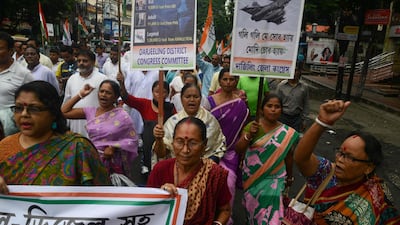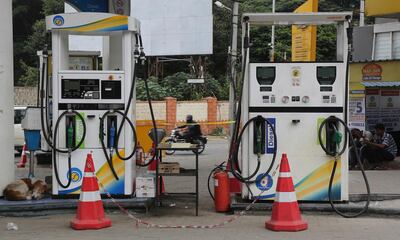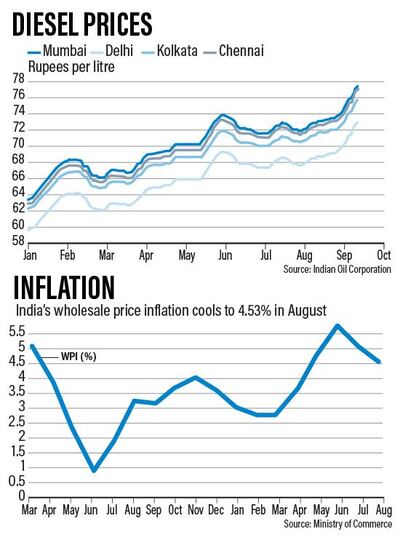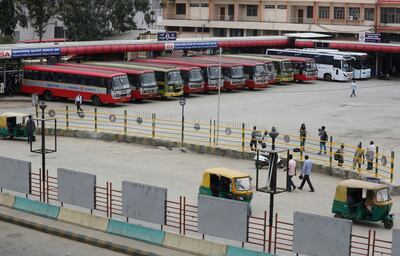Dinesh Gaikwad, a truck driver in Mumbai, last Monday went on strike, joining a nationwide protest called by opposition leaders over soaring fuel prices.
“The cost of diesel is going up daily,” he says. “It's reducing my profits.”
Petrol and diesel rates have been hitting record highs in India, up by as much as 20 per cent since the start of year, due to rising global crude oil prices and a weak rupee.
Like Mr Gaikwad, many businesses and individuals in India are feeling the impact of surging fuel costs, which pose a major inflationary risk. With India importing most of the oil it requires, higher costs also weigh on the country's current account deficit, which is negative for the economy.
This comes at a time when India's economy has been picking up, with gross domestic product growth accelerating to 8.2 per cent in the April to June quarter, according to official data.
“Naturally, the rise in oil and fuel prices is impacting India,” says Ajay Kedia, the director at Kedia Commodity Comtrade, a broker based in Mumbai. “And any further rises could greatly affect the economy and businesses.”
India is the world's third-largest importer of oil and its appetite for fuel is on the rise, driven by its expanding economy, a growing manufacturing sector and urbanisation. It relies on imports for 80 per cent of its oil demand.
Crude oil prices have been increasing globally amid the US renewing oil export sanctions on Iran. At the same time, the Indian rupee has been tumbling to all-time lows against the dollar, which makes oil imports more expensive.
But the opposition Congress party, which led Monday's protest, is among those blaming India's steep taxes on petrol and diesel for expensive fuel. It is calling for cuts on duties.
Fuel costs vary across India's 29 states, which impose their own levies on top of taxes levied by the central government. The state of Maharashtra, where Mumbai is located, has the highest tax on petrol at 39 per cent. In Mumbai, petrol prices have climbed to an all-time high above 89 rupees (Dh4.53) a litre, while diesel crossed 78 rupees a litre.
The states of Rajasthan, West Bengal, and Andhra Pradesh did respond to the protest with fuel price cuts. Rajasthan cut VAT on petrol and diesel by 4 per cent, West Bengal reduced prices by 1 rupee a litre on petrol and diesel, and Andhra Pradesh reduced the prices by 2 rupees a litre. But the central government, which received 2.67 trillion rupees from taxes on petroleum products in the financial year to the end of March 2017, has not given any indication that it will reduce rates, blaming external factors beyond its control for the uptick in prices.
“[The] reduction of excise duty or VAT by the central and state governments will mean lower revenue collections,” says Deepak Jasani, the head of retail research at HDFC Securities, a financial services firm headquartered in Mumbai. “If the excise duty is reduced by 1 rupee a litre, it might lead to reduction in revenue collections of around 70bn to 80bn rupees a year.”
Meanwhile, there are some calls for fuel to be brought under the goods and services tax (GST), a uniform nationwide tax system, which was introduced last year. Fuel levies would be likely to come down in many states if fuel was brought under this regime. The other option is for the government to provide subsidies on diesel and petrol, but this would also be a drain on its coffers.
_______________
Read more:
The race is on: Plans for Hyperloop technology gather pace in India
Mittal's Essar bid overly complicated by legal drama
_______________
“Ideologically governments have moved away from providing a subsidy on these products, which are market determined,” says Mr Jasani.
The whole situation has become politically sensitive, though, given the fact that general elections are coming up next year. This is adding to the pressure on New Delhi to intervene to help bring down fuel costs.
On Friday, finance minister Arun Jaitley and prime minister Narendra Modi held a meeting to discuss the economic situation in the county, which resulted in the government announcing a series of steps to try to calm concerns and stabilise the rupee. These included making efforts to reduce non-essential imports.
"External factors like policy decisions taken by the US that is seeing the dollar strengthen, global crude prices and trade wars are impacting us despite India having strong macroeconomic fundamentals," said Mr Jaitley following the meeting, according to the business newspaper Mint.
Analysts say that there are factors on the horizon that could prevent India from getting any sustained relief from soaring fuel prices over the coming months.
India is under pressure from the US to curb exports from Iran, with Washington planning to reimpose oil export sanctions on Tehran in November. India has become increasingly dependent on Iran for oil and is its biggest client after China, with its purchases sweetened by attractive offers on shipping and insurance. By curbing imports from Iran, this would mean that India would have to source oil at greater costs from other countries, at a time when global crude prices could edge higher.
“India’s macroeconomic position would worsen if oil prices were to shoot above $80 a barrel,” analysts at Kotak Institutional Equities wrote in a research note. Surging crude rates could hit India hard “given oil’s large influence on its current account deficit and currency, inflation and interest rates and fiscal deficit and bond yields”.
This could bring an end to the easing inflation levels that India has seen of late. Wholesale price inflation data released on Friday showed that it cooled for the second month in a row in August to 4.53 per cent on the year. This was helped by lower food prices, but the figures show crude petroleum prices rose by 53.47 per cent in August year-on-year.
If upward pressures on oil prices do continue, India's state-owned oil firms may be pushed by New Delhi to absorb some of the costs.
“Government-owned upstream oil companies face the risk of unfavourable government action in the form of subsidies or discounts on oil sales,” says Mr Jasani. “In the downstream sector, if oil prices continue their upward trajectory or the rupee continues to depreciate, pressure could build up on public sector oil marketing companies to restrain the increase in prices of auto fuels, which could compress the marketing margins of the latter.”
Meanwhile, many business owners remain concerned that they are going to continue to feel the heat.
“For my business and other transporters' business, fuel is one of our main inputs,” says Anil Vijan, the general secretary of the Bombay Goods Transport Association, an industry body in Mumbai. “It's a very sensitive issue. The transporters are very unhappy about this situation. "Unfortunately it comes at a time when demand for diesel picks up in India, with the festive season starting. We do blame the central government as well as the state government because of the high taxes.”
There are solutions that could help in the long term, analysts say. But for now it seems that India will have to bear the pain of higher fuel costs.
“There is very little that the Indian government can do to control this situation,” says Mr Jasani. “It has been promoting domestic production of oil and gas by putting up bidding for discovered oil and gasfields.
"However this will take time to have a material impact on imports. The shift to renewables has gathered pace but there is still a long way to go.”




